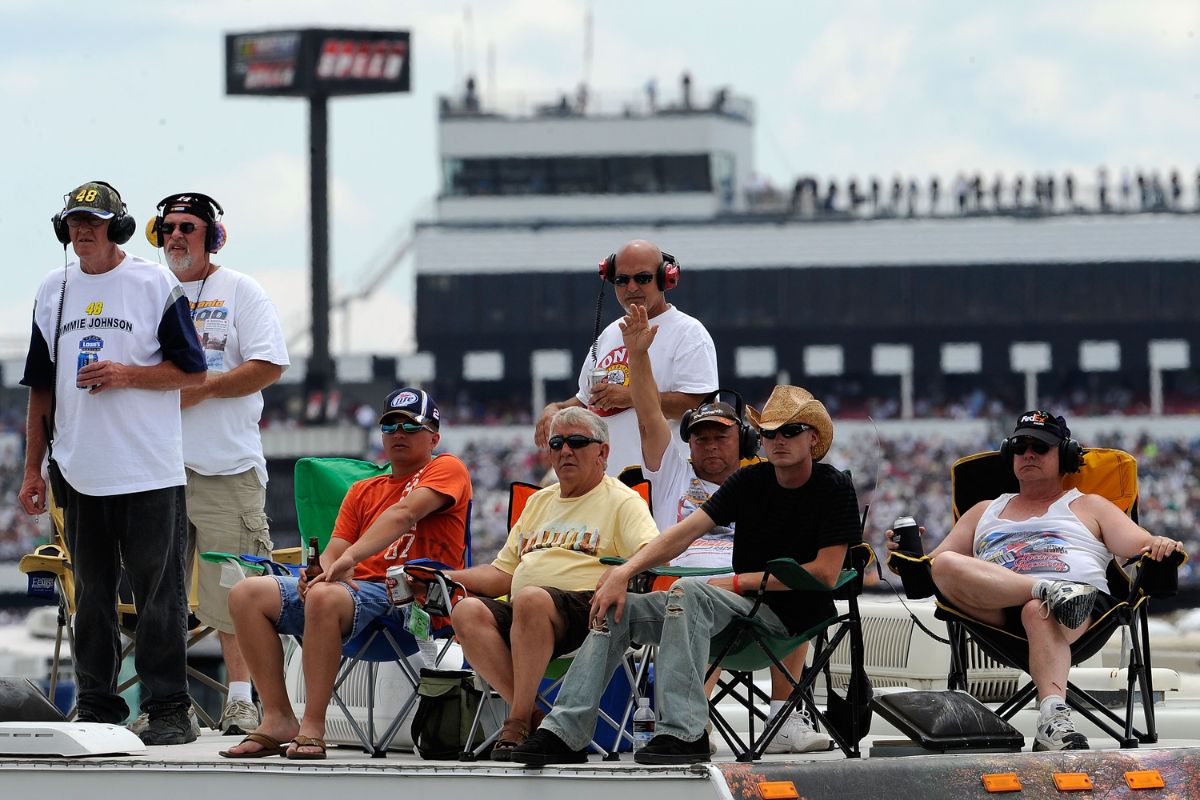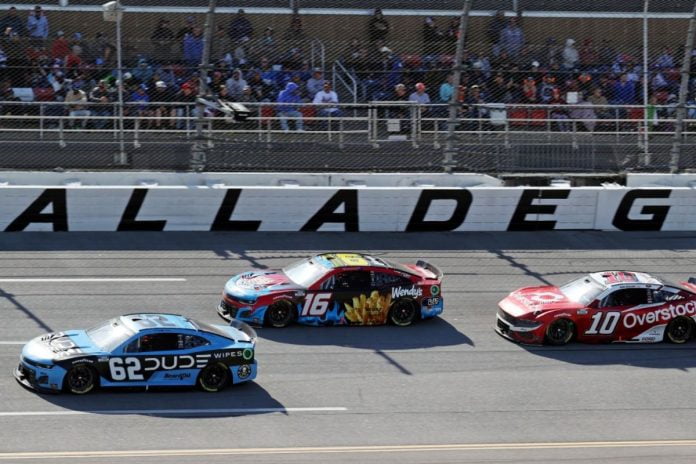Fuel-Saving Tactics Trigger Fans: The recent NASCAR event at Talladega has ignited a debate among racing enthusiasts and critics alike, centering on the prevalent use of fuel-saving strategies that many have condemned as ‘boring.’ This tactical shift, aimed at efficiency over the traditional, adrenaline-pumping speed races, not only impacted the competitive spirit of the event but also raised questions about the evolving nature of motorsports. As fans express their disappointment, the issue transcends mere race outcomes, touching on broader implications for the sport’s future and its alignment with audience expectations.
Key Takeaways
- Fans criticized the focus on fuel conservation at Talladega, calling it a deviation from traditional, exciting NASCAR racing.
- The strategic shift to fuel-saving led to a less engaging and visually spectacular race, disappointing spectators.
- Discontent spread on social media, with fans voicing their dissatisfaction and calling the race “boring.”
- The emphasis on fuel efficiency over speed and competition risked alienating NASCAR’s passionate fanbase.
- Critics argue that prioritizing fuel-saving undermines the essence of NASCAR, which is centered on high-speed and competitive racing.
NASCAR Fans React to Disappointing Talladega Fuel-Saving Race
At the recent GEICO 500 at Talladega, NASCAR fans expressed significant disappointment as drivers prioritized fuel conservation over the high-speed racing traditionally expected at such events. This strategic shift, which diverged from the anticipated thrills, marked a notable departure from NASCAR’s historical emphasis on sheer velocity and aggressive overtaking actions. The outcome of the race was largely influenced not by daring driving or tactical genius regarding track position, but by fuel management—a less visually spectacular aspect of motor racing that left many enthusiasts feeling underwhelmed.
The concern among spectators centered around the transformation of what was anticipated to be a dynamic contest into a more calculated, endurance-focused event. Fans who had gathered to witness the hallmark adrenaline-pumping action were instead presented with a more subdued spectacle, where the roar of engines often gave way to cautious pacing.
Moreover, the pre-race interviews had hinted at this shift, setting an anticipatory tone for a strategy-heavy race. Drivers and teams, aware of the critical importance of fuel economy under the race’s specific conditions, adjusted their approaches accordingly. This preventative scaling back of aggression in favor of conservation was a tactical decision, but one that did not align with the expectations of many fans, who prioritize excitement and speed over strategic fuel play.

Fans Express Frustration Over Lackluster Racing
Discontent surged among NASCAR enthusiasts as they voiced their frustration over the lackluster racing experience at Talladega Superspeedway, particularly criticizing the unexpected shift towards fuel-saving tactics. This strategic change, intended to optimize efficiency and potentially secure a better finish by conserving fuel, paradoxically drained the excitement from a race historically celebrated for its thrills and aggressive overtaking actions. Fans argue that this tactic undermines the essence of NASCAR racing, turning what should be a fiercely competitive and enthralling spectacle into a cautious, calculated affair.
- Loss of Competitive Spirit: Traditionally, NASCAR races at Talladega are known for their nail-biting finishes, with drivers pushing their limits. The new fuel-saving approach has shifted focus from racing skill to fuel conservation.
- Disruption of Race Dynamics: The dynamics of the race change significantly with fuel-saving tactics. Instead of aggressive overtaking and strategic blocking, the race becomes more about maintaining a steady pace and minimal acceleration, which many fans find monotonous and unengaging.
- Impact on Fan Engagement: The excitement and unpredictability of races draw large crowds and viewership. With the introduction of overly cautious strategies, there is a risk that long-time supporters might lose interest, potentially affecting attendance and viewership figures.

Twitter Flooded with Disenchantment After Talladega Race
Following the controversial Talladega race, a significant number of fans took to Twitter to express their dissatisfaction, as evidenced by the overwhelming negative responses in Jeff Gluck’s poll asking if it was a good race. The digital platform became a battleground of disenchantment, where spectators articulated their discontent with what many perceived as a disappointing spectacle. This reaction marks a deviation from the usually fervent enthusiasm that envelops Talladega’s showdowns, suggesting a shift in fan expectations and engagement.
Was Talladega a good race?
— Jeff Gluck (@jeff_gluck) April 22, 2024
The analysis of the Twitter discourse reveals a pattern of criticism that centers not just on isolated incidents, but on the broader racing experience. Fans lamented the lack of aggressive driving and strategic daring that typically define Talladega’s allure. The noticeable frustration highlighted by the poll results, where negative sentiment predominated, reflects a growing concern that the race’s excitement is being diluted.
Was Talladega a good race?
— Jeff Gluck (@jeff_gluck) April 22, 2024
Fuel-Saving Tactic Draws Criticism
Amidst the broader discontent expressed on social media, the use of fuel-saving tactics at the Talladega tri-oval race track has emerged as a particular point of criticism among fans and racers equally. This strategy, which prioritizes conservation over competition, fundamentally shifts the dynamics of the race, leading to a more cautious, less engaging spectacle. The implications of such a strategy extend beyond mere viewer dissatisfaction, affecting the core aspects of racing that fans and participants hold dear.
“Didn’t watch the 2nd stage because I was busy, but seemed like a great race, especially after the Toyota’s wrecked”.
“One of the worst SS races in quite some time”
“As a whole, nah… lol. Just a bunch of skittles swirling a really big toilet bowl…And a No is a hard vote for me to cast”.- Fans Reaction
- Impact on Driver Skill Development: Fuel conservation strategies limit opportunities for drivers to fully challenge themselves and their vehicles. This can be particularly detrimental in a high-stakes environment like Cup racing, where mastering every aspect of car handling and racecraft is significant.
- Fan Engagement and Race Dynamics: Races are spectacles that thrive on unpredictability and high-speed action. When drivers are compelled to conserve fuel rather than compete aggressively, it leads to a predictable and monotonous race, thereby diminishing the excitement and engagement of the audience.
Josh Berry Highlights Challenges for Rookie Drivers
As he navigates the challenges of his rookie season, Josh Berry’s recent experience at Talladega highlights significant obstacles faced by newcomers, particularly when conservative strategies like fuel-saving overshadow the essential competitive aspects of racing. Berry, who is just starting on his Cup adventure with Stewart-Haas Racing, finds himself in a complex learning curve. With only a dozen starts under his belt, each race is not just about finishing but about gaining invaluable track experience and knowledge.

Berry’s 16th-place finish at Talladega, influenced heavily by the team’s fuel-saving tactics, emphasizes a broader issue that extends beyond individual performance. For rookies like Berry, the reliance on such strategies can suppress their ability to fully engage with the racing process, focusing instead on conservation rather than competition.
Moreover, Berry’s critique of the fuel-saving strategy as ‘hardly helpful’ for rookies reveals a tension between team objectives and driver development. Racing, at its core, is as much about tactical knowledge as it is about raw speed and overtaking skills.
News in Brief: Fuel-Saving Tactics Trigger Fans
The recent Talladega race, characterized by fuel-saving tactics, has evidently sparked significant discontent among NASCAR enthusiasts. They lament the sacrifice of high-speed competition for efficiency. This strategic shift not only diluted the race’s excitement but also ignited a necessary conversation about maintaining a perfect balance between competitive integrity and tactical judgement in NASCAR events.
It is important that organizers heed this feedback to realign race strategies with fan expectations. This action is crucial for preserving the sport’s thrilling essence and enhancing spectator engagement.
Our Reader’s Queries
ALSO READ: Fans Blame Announcers Jinx: BJ McLeod’s Talladega Misfortune


